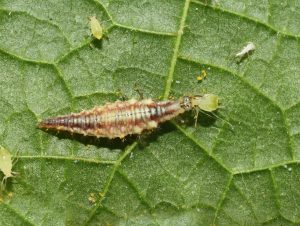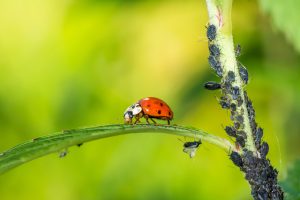
Keeping Aphids Out of Your Winter Garden

Here in North Florida, mild winters allow for extended growing seasons, but they also enable pests like aphids to stay active year-round. While freezing temperatures in colder regions slow down or kill off aphids, our area’s warm spells allow them to thrive on cool-season crops like kale, collards, and broccoli.
These soft-bodied insects feed on plant sap, which weakens plants, stunts growth, and can spread disease. Without as many natural predators active during winter, aphid populations can quickly multiply, making early and consistent management key to a healthy winter garden.
How to Manage Aphids
Using an Integrated Pest Management (IPM) approach is essential for effective aphid control. IPM focuses on preventing pest problems through cultural practices, monitoring, and encouraging natural controls, while reserving chemical treatments as a last resort. With IPM, you can keep your garden healthy while minimizing pesticide use.
- Inspect Plants Regularly: Aphids often hide on the undersides of leaves and in new growth. Regularly checking for them can help catch infestations early before they spread. For smaller infestations, simply spraying aphids off with water can be effective and is a low-impact method of control.

Ladybugs are natural predators that help control aphid populations without the need for chemical treatments. Photo by Manfredxy, Adobe Stock. - Encourage Beneficial Insects: Some ladybugs, lacewings, and parasitic wasps remain active in winter and can help control aphids. Planting flowers like calendula, dill, and fennel attracts these natural predators by providing them with nectar, pollen, and shelter. Avoid broad-spectrum pesticides that harm beneficial insects, and consider adding a few of these plants to support a balanced garden ecosystem.
- Practice Crop Rotation: If aphids were an issue on certain crops, rotating them to a new spot next season can disrupt their life cycles and reduce populations over time.
- Use Least Toxic Chemical Controls: For larger outbreaks, try insecticidal soaps or neem oil. These least toxic options can be effective against aphids while reducing harm to beneficial insects when applied carefully. Be sure to follow all label instructions closely to ensure safe and effective application.
With these simple strategies, you can keep aphids in check and enjoy a healthy, productive garden throughout the winter months.
 3
3

